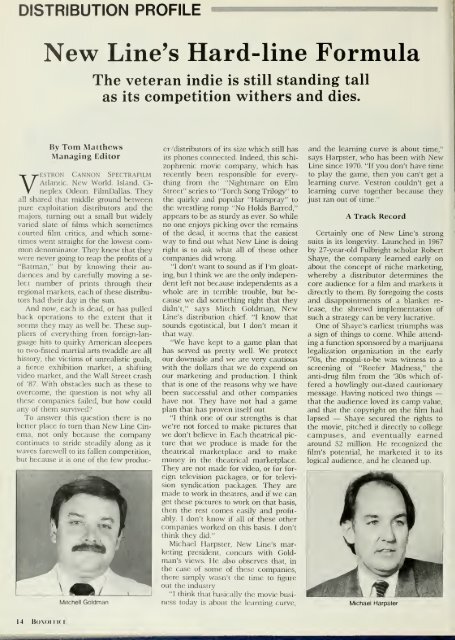Boxoffice-September.1989
Create successful ePaper yourself
Turn your PDF publications into a flip-book with our unique Google optimized e-Paper software.
DISTRIBUTION PROFILE<br />
New Line's Hard-line Formula<br />
The veteran indie is still standing tall<br />
as its competition withers and dies.<br />
VESTRON<br />
By Tom Matthews<br />
Managing Editor<br />
Cannon Spectrafilm.<br />
Atlantic. New World. Island. Cineplex<br />
Odeon. FilmDallas. They<br />
all shared that middle ground between<br />
pure exploitation distributors and the<br />
majors, turning out a small but widely<br />
varied slate of films which sometimes<br />
courted film critics, and which sometimes<br />
went straight for the lowest common<br />
denominator. They knew that they<br />
were never going to reap the profits of a<br />
"Batman," but by knovdng their audiences<br />
and by carefully moving a select<br />
number of prints through their<br />
regional markets, each of these distributors<br />
had their day in the sun.<br />
And now, each is dead, or has pulled<br />
back operations to the extent that it<br />
seems they may as well be. These suppliers<br />
of everything from foreign-language<br />
hits to quirky American sleepers<br />
to two-fisted martial arts twaddle are all<br />
history, the victims of unrealistic goals,<br />
a fierce exhibition market, a shifting<br />
video market, and the Wall Street crash<br />
of '87. With obstacles such as these to<br />
overcome, the question is not why all<br />
these companies failed, but how could<br />
any of them survived?<br />
To answer this question there is no<br />
better place to turn than New Line Cinema,<br />
not only because the company<br />
continues to stride steadily along as it<br />
waves farewell to its fallen competition,<br />
but because it is one of the few produc-<br />
14 BOXOKUCK<br />
Milchell Goldman<br />
er/distributors of its size which still has<br />
its phones connected. Indeed, this schizophrenic<br />
movie company, which has<br />
recently been responsible for everything<br />
from the "Nightmare on Elm<br />
Street" series to "Torch Song Trilogy" to<br />
the quirky and popular "Hairspray" to<br />
the wrestling romp "No Holds Barred,"<br />
appears to be as sturdy as ever. So while<br />
no one enjoys picking over the remains<br />
of the dead, it seems that the easiest<br />
way to find out what New Line is doing<br />
right is to ask what all of these other<br />
companies did wrong.<br />
"I don't want to sound as if I'm gloating,<br />
but I think we are the only independent<br />
left not because independents as a<br />
whole are in terrible trouble, but because<br />
we did something right that they<br />
didn't," says Mitch Goldman, New<br />
Line's distribution chief "I know that<br />
sounds egotistical, but I don't mean it<br />
that way.<br />
"We have kept to a game plan that<br />
has served us pretty well. We protect<br />
our downside and we are very cautious<br />
with the dollars that we do expend on<br />
our marketing and production. I think<br />
that is one of the reasons why we have<br />
been successful and other companies<br />
have not. They have not had a game<br />
plan that has proven itself out.<br />
"I think one of our strengths is that<br />
we're not forced to make pictures that<br />
we don't believe in. Each theatrical picture<br />
that we produce is made for the<br />
theatrical marketplace and to make<br />
money in the theatrical marketplace.<br />
They are not made for video, or for foreign<br />
television packages, or for television<br />
syndication packages. They are<br />
made to work in theatres, and if we can<br />
get these pictures to work on that basis,<br />
then the rest comes easily and profitably.<br />
I don't know if all of these other<br />
companies worked on this basis. I don't<br />
think they did."<br />
Michael Harpster, New Line's marketing<br />
president, concurs with Goldman's<br />
views. He also observes that, in<br />
the case of some of these companies,<br />
there simply wasn't the time to figure<br />
out the industry'<br />
"I think that basically the movie business<br />
today is about the learning curve,<br />
and the learning curve is about time,"<br />
says Harpster, who has been with New<br />
Line since 1970. "If you don't have time<br />
to play the game, then you can't get a<br />
learning curve. Vestron couldn't get a<br />
learning curve together because they<br />
just ran out of time."<br />
A Track Record<br />
Certainly one of New Line's strong<br />
suits is its longevity. Launched in 1967<br />
by 27-year-old Fulbright scholar Robert<br />
Shaye, the company learned early on<br />
about the concept of niche marketing,<br />
whereby a distributor determines the<br />
core audience for a film and markets it<br />
directly to them. By foregoing the costs<br />
and disappointments of a blanket release,<br />
the shrewd implementation of<br />
such a strategy can be veiy lucrative.<br />
One of Shaye's earliest triumphs was<br />
a sign of things to come. While attending<br />
a function sponsored by a marijuana<br />
legalization organization in the early<br />
'70s, the mogul-to-be was witness to a<br />
screening of "Reefer Madness," the<br />
anti-drug film from the '30s which offered<br />
a howlingly out-dated cautionary<br />
message. Having noticed two things —<br />
that the audience loved its camp value,<br />
and that the copyright on the film had<br />
lapsed — Shaye secured the rights to<br />
the movie, pitched it directly to college<br />
campuses, and eventually earned<br />
around $2 million. He recognized the<br />
film's potential, he marketed it to its<br />
logical audience, and he cleaned up.<br />
Michael Harpster

















